Brent Hartinger's Blog, page 16
September 20, 2012
Coming Soon: GEOGRAPHY CLUB, the Movie!
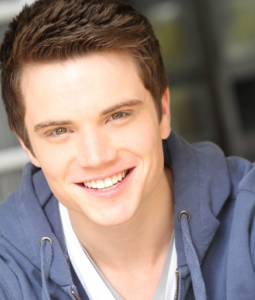
Cameron Deane Stewart
Those of you who follow me on Twitter or Facebook already know that there’s a movie version of my 2003 novel Geography Club in the works, filming just wrapped, for a 2013 release.
I spent some of June down in Los Angeles on the set, and I know I’m biased, but I can’t tell you how impressed I am with the project and the talent involved in making it happen.
But I have to confess: it was all a little surreal. I watched the filming of one scene that had 1000 extras, and I thought, “You’re kidding! All this for a little book I wrote more than ten years ago?” I imagine it’s a little like what the pharaohs felt like when the pyramids were being built (I’d like to think I lack their delusions of grandeur, but who knows?).
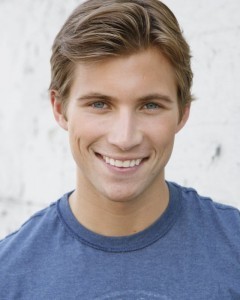
Justin Deeley
I think people will be really pleased with the cast. Russel and Kevin are played by Cameron Deane Stewart, who’s done a few things but is still pretty unknown, and Justin Deeley, who is currently on 90210.
I know everyone always says about young actors, “He’s going to be a big star someday!” But I really do think they’re both going to be big stars someday. Plus, they’re both fantastic for the parts (and they also seem like really nice guys, which counts for a lot).
The rest of the cast includes Hairspray‘s Nikki Blonski (Terese), Ten Things I Hate About You‘s Ally Maki (Min), Transformer‘s Andrew Caldwell (Gunnar), Glee‘s Alex Newell (Ike), Hannah Montana‘s Teo Olivares (Brian Bund), and Joyful Noise’s Dexter Darden (Jarred).
Those of you who look at the picture of Ally and think, “Wait, she doesn’t look like Min is supposed to look!” Rest assured that when she’s in hair-and-make-up, she looks perfect (sounds perfect too).
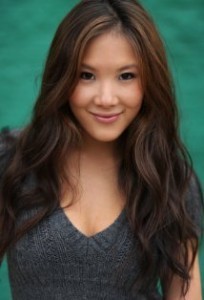
Ally Maki
There weren’t any adults in the book, but there are few in the movie: Scott Bakula (Kevin’s dad), SNL’s Ana Gasteyer (the health teacher), and Two and a Half Men’s Marin Hinkle (Kevin’s mom).
As for the director (Gary Entin), screenwriter (Edmund Entin), producers (Michael Huffington and Anthony Bretti), and executive producers (Frederick Levy and Bryan Leder), they all treated me like royalty. A movie is a totally different thing than a book — this is a movie based on and inspired by the book, not a film of the book.
Even so, I was touched and honored and humbled how important the project (and the book) seemed to be to them.
I’ve always heard the Hollywood cliche about how horrible they treat writers there, but that hasn’t been my experience at all. So far, I couldn’t be more pleased.

September 10, 2012
WIZ WAR, That Game Min and Russel Play in GEOGRAPHY CLUB? It’s Back in Print!
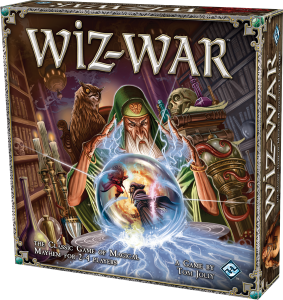 Readers of Geography Club may be curious about a board game that Russel and Min play in the opening chapters (when Min and Russel come out to each other).
Readers of Geography Club may be curious about a board game that Russel and Min play in the opening chapters (when Min and Russel come out to each other).
It is, in fact, a real game, a terrific one that I’ve spent many hours playing with my friends. But even when I was writing Geography Club (in 2000 and 2001), I knew that the game was out-of-print and that it was extremely different to get a copy.
Good news! It’s back in print!
I can’t recommend it highly enough. The basic idea is that two (or more) wizards are in the middle of a intense magic battle, but victory or defeat depends as much on strategy as on your various spells. Once a spell is cast, it can be countered, subverted, or reflected — and then countered, subverted, or reflected again by the casting wizard.
(Needless to say, it was the perfect game for Min and Russel to play when they’re revealing secrets to each other.)
Anyway, it’s that kind of great game that is part luck and part strategy. And when I’m done with a good game, I’m usually flushed with sweat and exhilarated, exactly the way I am when I’ve just seen a fantastic play or read a terrific book.

September 4, 2012
I Hate Writing (But I Love Having Written!)
For me, writing is hell.
Take a typical week. If I start early on a Monday morning, I almost never get anything written until about 4 PM. And truthfully, I won’t really get much of quality done until maybe Tuesday afternoon.
By Wednesday, it’s usually starting to flow. And by Thursday, it’s a gusher. I think I do more real work on Thursdays than every other day combined.
It’s not that I procrastinate (although I’ve been known to do that). These days, I know to immediately unplug the Internet before even attempting any writing. And I force myself to sit in that chair for eight-plus hours a day whether it’s coming or not.
No, I just find writing fiction — at least any fiction that’s worth writing — to be really, really hard. It basically destroys me. I stew, I agonize, I obsess. It’s all about the search for the “perfect” plot point or the absolute “right” representative detail. And since, of course, there’s no such thing as “perfection,” I’m sort of doomed to this state of perpetual dissatisfaction.
If the writing’s not coming (which is about fifty percent of the time), I feel guilty and edgy and worthless. And if it is coming, I feel anxious and fearful that it’s going to stop — and, yes, dissatisfied that it’s not quite right.
Okay, sure, when it is going really well, there are these fleeting moments of euphoria, but they’re few and far between.
I always compare writing to getting a boulder rolling. It’s really, really, really hard for me to get it moving– so hard I really have to work myself up to even trying. And it’s so hard that once I get it rolling, I don’t want to stop, not until I’m done with the whole project.
This last part has served me well. I’m a pretty prolific writer and this is the reason why: my lifestyle (and my lack of kids) allows me to enter these manic “writing frenzies” where I really do just write and write and write until I finish a first draft.
Unfortunately, when my writing frenzy is over, I’m utterly exhausted. Oftentimes I get sick, and I’ve usually lost weight because I’ve forgotten to eat.
Like I said, for me, writing is hell.
I’m envious of writers like Stephen King, who writes for exactly four hours every day (even Christmas), stopping at noon. And I feel bad that I don’t do what all the writing books say I should do: keep a journal, constantly observe the world, make notes on napkins.
But when I’m not writing, I’m so not writing. I’m reading or biking or cooking or playing video games or going to plays and movies — basically, enjoying life — but I am definitely not writing. I don’t think I’ve ever once had an inspiration for anything writing-related if I’m in one of my “non-writing” phases.
I can’t just turn my creativity on and off, and it’s definitely not always running in the background, like my computer’s anti-virus program.
For me, it’s all or nothing: all-consuming or completely checked out.
But I’ve tried it the other ways. This is the only process that works for me. After twenty years of writing, the only thing that’s gotten any easier is that at least I now know that it will come eventually.
So why do I write if I hate it so much?
Well, it’s partly that I was so bull-headed as a younger writer, so determined to conquer the world, that I didn’t bother to learn any other marketable skills. Basically, writing is the only thing I know how to do that makes any real money!
But it’s more than that. While I truly hate writing, I absolutely love the feeling of having written. The sense of satisfaction and accomplishment I feel when I’ve finally finished something I’m truly proud of is overwhelming.
I’ve often wondered if non-artists feel as much satisfaction and meaning in their jobs as I do with my writing (in the end anyway). I really hope so.
And those fleeting moments of euphoria I mentioned before? I didn’t mean to gloss over them like that, because they’re amazing. In fact, they feel so good that they’re even worth all the hell I go through getting to them.
My close friends know that I’m not a religious person (at all!). But I gotta say: I find the writing process to be a transcendent experience. It’s such a rush, sacrificing everything for that elusive glimpse of infinity — and then, every now and then, getting it.
In short, I really, really hate writing. But boy, do I love having written.

July 30, 2012
Two New Interviews: On Career and Craft
Whenever I’m asked to do an interview, I always think, “What, little ol’ me? Why I do declare, I don’t have anything to say!” Then I open my mouth, and I end up jabbering on forever.
Anyway, here are two new interviews for those who haven’t already had way too much of my jabbering:
This interview with my friend Cynthia Leitich Smith at her blog Cynsations is mostly about my career as a writer.
Meanwhile, this interview over at Carpe Keyboard is mostly about the craft of writing.

July 29, 2012
Ask the Brain: Update on THE ELEPHANT OF SURPRISE. Plus, Should I Change My Name?
Ask the Brain is a semi-regular column where readers can ask me advice about love, life, writing, and, well, just about anything. My massive, all-powerful brain will deign to grant an answer. Either that, or I’ll just make some s**t up.
Speaking of which, do you have a question for the brain? Ask it here!
So what’s up with The Elephant of Surprise, the next Russel Middlebrook book? When exactly is it coming out? Why isn’t it out ALREADY?! — An Impatient Fan
The Brain Responds:
Um, well … what with the movie version of Geography Club coming out next year (see below), The Elephant of Surprise has been pushed back a bit. We’re now planning on an early 2013 release.
What’s the book about anyway? As you may recall, Double Feature (the third book in the Russel Middlebrook series) left the Russel-Kevin-Otto love triangle on a bit of a cliff-hanger. The Elephant of Surprise starts to finally resolve that conflict (and the story will wrap up completely in the fifth book, coming in 2013). But as usual, there’s a whole new story, with some (hopefully) great new characters as well, and new storylines for Min and Gunnar too.
Nutshell? Russel gets involved with yet another secret organization — the most interesting one yet, IMHO. It’s a hidden society that exists in real life, in almost every city in America.
But if I told you more, I’d spoil the surprise of Surprise.
Hello, Brain: My dream has always been to be an author. The problem is that I’m leery my name will work against me. My first has a “Christian” implication, and my last is the name of a town. Then I also plan on writing both poetry and fiction, which leaves the possibility of confusion. I’ve considered both using a pen name and changing my name legally, but the drawbacks leave me wondering. I’m hoping to self-publish and open a website, and if I use a pen name, it might not work well, but if I change my name, I worry it’ll cause past files and records to conflict with my new name. Advice? — What’s In a Name?
The Brain Responds:
First, the good news: it’s entirely possible for a writer to have a pen name, and it doesn’t require any legal name-change, nor does it create any weird legal situations (you typically sign all contracts and receive all payments with your real name).
There is also something to be said for name “branding”: the idea that an author’s works in one particular genre are all written under one name, either a pen name or the actual name, while works in other genres are written under different names. , but the point is, it can give you a certain freedom, and it definitely makes a lot of sense from a marketing POV.
And let’s face it: if your name really does seem to be in direct conflict with the genre you’re writing in — if your name is “Lilith” and you’re trying to write Christian fiction — it isn’t a terrible idea to change it.
That said, keep in mind that “weird” authors’ names aren’t usually a problem. In fact, a weird name can actually be a good thing, because it’s more memorable. Writers aren’t like movie stars: most of the time, “quirky” is salable.
Besides, don’t you want the people who teased you in high school to know you’re now a world-famous author?
But I’m getting a sense from your email that this issue isn’t quite any of these issues. Is it the fact that you’re just not very crazy about your name? If so, why not change it, either legally or merely professionally?
However, before you do, I advise you to ask five of your friends: “What do you really think of my name? I’m thinking of changing it, so please be totally honest.” Then listen to what they have to say. It’s very possible that the issue isn’t really your name, but rather some negative associations you have with it for reasons you’re not quite conscious of. You can still change your name, either legally or professionally, but at least you’ll know exactly why you’re doing it.
Now do you have a question for the Brain? Ask it here!

June 26, 2012
And Now I’m in Another Anthology! What’s Up with all the Freaks and Misfits in A GAME OF THRONES?
A couple of days ago, I mentioned that I’d been contributing to a lot of anthologies. The latest is being released this week. It’s called Beyond the Wall: Exploring George R. R. Martin’s A Song of Ice and Fire and it’s a whole bunch of interesting new essays about almost every aspect of the books (and also the HBO TV series): Does the fact that it’s fantasy bias people’s view of it? Is the series’ portrayal of violence against women exploitative?
 My essay, “A Different Kind of Other,” is about all the “freaks and misfits” in the series: by my count, seven of the fourteen point-of-view characters break major social or gender norms, and plenty of secondary characters do too. Some characters are gay, some are disabled, some cross-dress, and one is a dwarf (a real dwarf, not a “fantasy” one). And in pushing these characters front and center, and by making them so three-dimensional and sympathetic, George R. R. Martin is breaking a few norms himself.
My essay, “A Different Kind of Other,” is about all the “freaks and misfits” in the series: by my count, seven of the fourteen point-of-view characters break major social or gender norms, and plenty of secondary characters do too. Some characters are gay, some are disabled, some cross-dress, and one is a dwarf (a real dwarf, not a “fantasy” one). And in pushing these characters front and center, and by making them so three-dimensional and sympathetic, George R. R. Martin is breaking a few norms himself.
Basically, he’s bringing a 21st century sensibility into the genre of fantasy, which until the last 20 years, has focused almost exclusively on straight, white, able-bodied, and conventionally-gendered men. (If you weren’t all of these things, you tended to be either the love interest, the comic relief, or one of the villains.)
And, I argue, it’s exactly this “modern” sensibility that makes the books feel so fresh and original.
Anyway, the publisher, SmartPopBooks, is celebrating the official release of Beyond the Wall: Exploring George R. R. Martin’s A Song of Ice and Fire this week, so check out their website, enter giveaways to win your own copy of Beyond the Wall, and check out a free essay from the anthology: http://www.smartpopbooks.com/an-event-of-ice-and-fire/.

June 24, 2012
Hey, I’m in Two New Anthologies! I Ask: Does MOCKINGJAY Suck? Plus, a Letter to My Teenage Gay Self
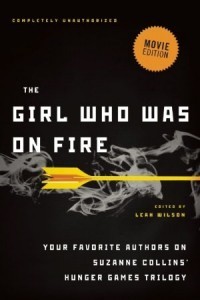 I haven’t had a new book out in over a year, and some people have been wondering what I’ve been up to.
I haven’t had a new book out in over a year, and some people have been wondering what I’ve been up to.
Partly, I’ve been writing a bunch of books — four in all — that’ll be out later this year, and in the years to come.
But I’ve also been contributing to a whole bunch of anthologies, which are books where different authors are invited to contribute essays or stories.
The first one is called The Girl Who Was on Fire, a collection of essays about The Hunger Games books (please note, my essay was written especially for the “movie edition” of the book, which came out earlier this year, not the original edition).
The question I ask is: “Does the Third Book Suck?” Because while I loved the first two books in the series, I was, sadly, really, really disappointed by Mockingjay. That said, I really did try to take an objective look at the issue, arguing both the “pro” and the “con” sides. (People who disagree with me say I at least argued their POV well.)
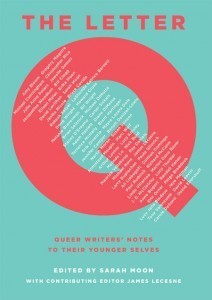 The next book I’ve got an essay in is called The Letter Q: Queer Writers’ Notes to Their Younger Selves. And it’s exactly what it sounds like: adult GLBT writers write what they wish they could say to themselves as teenagers.
The next book I’ve got an essay in is called The Letter Q: Queer Writers’ Notes to Their Younger Selves. And it’s exactly what it sounds like: adult GLBT writers write what they wish they could say to themselves as teenagers.
And wow, what a line-up of writers! Along with me, the contributors include Michael Cunningham, David Levithan, Brian Selznick, Terrence McNally, Armistead Maupin, Arthur Levine, Malinda Lo, Sarah Moon, Christopher Rice, Gregory Maguire, Nick Burd, Marion Dane Bauer, David Leavitt, and many others.
Basically, everybody!
A big part of the royalties go to the Trevor Project.
Check out The Girl Who Was on Fire here.

June 21, 2012
Annie Wilkes Makes a Good Point: A Lot of Writers Don’t Play Fair
A reader, responding to a note of mine that I’m working on two more sequels in the Russel Middlebrook series, posted this hilarious clip from the old movie Misery (about an insane woman who kidnaps a writer and forces him to write the book she wants).
As chance would have it, I’m literally halfway through Misery right now! (It was first a novel by Stephen King). I also just watched the movie.
Now Annie Wilkes is batshit crazy, of course. But thing is, I agree with her basic point: too many writers do things that aren’t “fair.” They cheat. And, worse, most readers and audience members don’t seem to care.
But I care! Nothing makes me madder than writers who cheat.
I suspect a lot of my readers care to. For what it’s worth, I’m trying really, really hard not to cheat with these next two books! (Cause I now know what my readers will do if I do…)




